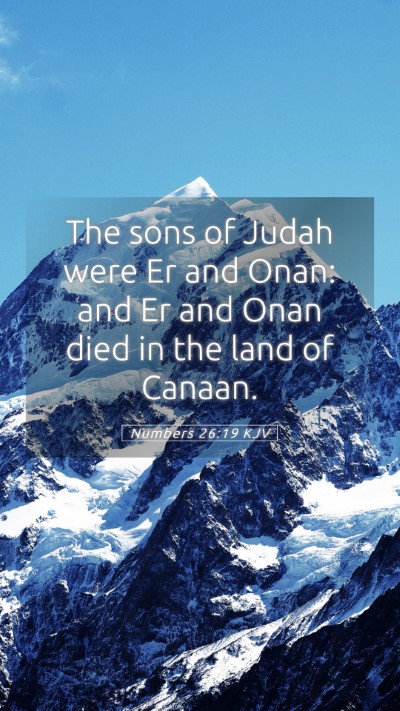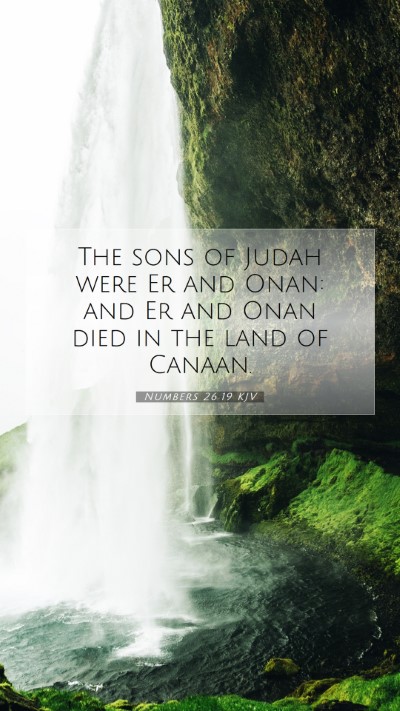Understanding Numbers 26:19
Numbers 26:19 states: "The sons of Judah were Er and Onan: and Er and Onan died in the land of Canaan." This verse offers significant insights into biblical lineage, divine judgment, and the historical context of the Israelites. Below, we summarize various public domain commentaries to help in understanding Scripture, exploring its interpretations and meanings.
Historical Context
In this passage, we see a mention of Er and Onan, the sons of Judah, highlighting their demise in the land of Canaan. This reflects the fulfillment of God's judgment upon sin. The lineage of Judah is critical as it sets the stage for significant biblical narratives, including the genealogy leading to King David and ultimately to Jesus Christ.
Commentary Insights
-
Matthew Henry:
Henry underscores the importance of recognizing the sins of Er and Onan. Their deaths serve as a sobering reminder of God's justice. Their story illustrates the consequences when one strays from divine commands, emphasizing the need for holiness in the lineage that would bear the Messiah.
-
Albert Barnes:
Barnes points out that the account of Er and Onan reflects the seriousness of disobedience and how it impacts families and inheritances. He comments that the deaths of the two brothers were not mere historical accounts but warnings against living in rebellion against God’s statutes.
-
Adam Clarke:
Clarke elaborates on the context of Judah's family, noting that Er was "wicked in the sight of the Lord," leading to his death. Onan’s actions in attempting to circumvent familial duties resulted in his demise as well. Clarke stresses the necessity of understanding God's law and the moral obligations placed upon family members.
Theological Significance
The mention of these two sons serves to illustrate the consequences of sin and disobedience. Their stories are imbued with a deeper understanding of God's righteousness and the dire consequences of moral failures. This narrative encourages readers to reflect on their own lives, considering the importance of adhering to divine commandments.
Application to Daily Life
As we delve into this verse, it becomes imperative to consider its application in contemporary life. The historical context warns against taking lightly the moral laws established by God. Individuals and communities are called to live according to divine principles to avoid the consequences demonstrated in the lives of Er and Onan.
Related Cross References
- Genesis 38:6-10: The narrative of Judah and Tamar, providing further context on Er and Onan's lives.
- Romans 6:23: The wages of sin is death, emphasizing the divine response to sin.
- 1 Chronicles 2:3: A genealogy of Judah that highlights the significance of the family line.
- Leviticus 20:10: The consequences of adultery and illicit relationships in the Old Testament law.
- Jeremiah 31:29-30: The idea of inherited sin, indicating responsibility in family lines.
In-depth Bible Verse Analysis
This verse is a clear example of how the Old Testament sets forth principles that can be interpreted beyond mere historical accounts. Through biblical exegesis, one can understand the broader implications of such narratives. Analyzing Numbers 26:19 with other scripture provides a clearer picture of how sin of previous generations impacts future ones, reinforcing the need for repentance and righteousness.
Conclusion
In conclusion, Numbers 26:19 serves as a poignant reminder of the gravity of sin and the necessity for adhering to God's commandments. Through the insights of biblical commentary, we gain a deeper understanding of the scripture's meaning and its applicability to our lives today. For those engaged in online Bible study or seeking Bible study resources, this passage offers profound lessons on both individual and collective accountability to God's law.


